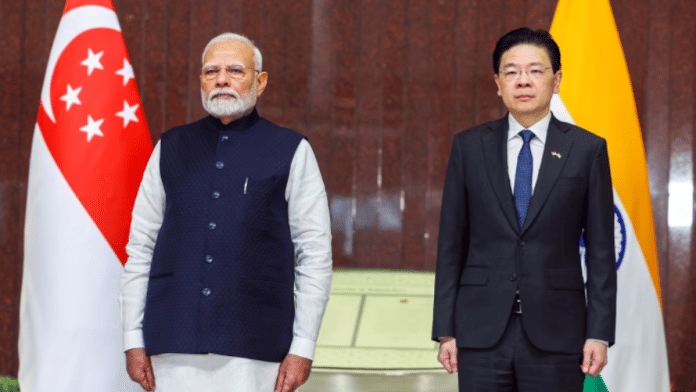New Delhi: From space and data storage to advanced manufacturing and co-development of small modular nuclear reactors, Singaporean Prime Minister Lawrence Wong’s three-day visit to New Delhi from Tuesday will see the South East Asian nation increase its stake in India’s economic growth story.
Diplomatic sources said that Wong’s visit will see India and Singapore announce a roadmap for Comprehensive Strategic Partnership (CSP), while at least five memorandums of understanding (MoUs) are under consideration apart from a joint statement focussing on eight pillars.
The eight pillars India and Singapore are looking to expand their partnership in are: economic cooperation, skills training, digitalisation, sustainability, connectivity, healthcare and medicine, defence and security and cultural exchanges.
The MoUs under consideration include the one for collaboration between IN-SPACe (Indian National Space Promotion and Authorisation Centre) and Singapore’s Office for Space Technology and Industry (OSTIN). Also, an agreement is likely to be announced between the Monetary Authority of Singapore and the Reserve Bank of India regarding cooperation on a central bank digital currency (CBDC).
The other MoUs are in the fields of civil aviation, green and digital shipping corridors, and skills development, the source said.
Prime Minister Narendra Modi and Wong are also set to virtually launch PSA’s Bharat Mumbai container terminal. The total project will see roughly $1.7 billion invested by the Singaporean company, which will see the container terminal handle roughly 50 per cent of total capacity at the port.
“During the visit, Prime Minister Modi and Prime Minister Wong are scheduled to hold bilateral discussions on 04 September 2025. Prime Minister Wong will call on Honorable President, Smt. Droupadi Murmu. External Affairs Minister Dr. S. Jaishankar and other dignitaries are also scheduled to call on Prime Minister Wong during the course of the visit,” the Ministry of External Affairs said in a statement Tuesday.
It is Wong’s first visit to India as the Prime Minister of Singapore. In 2024, Modi travelled to Singapore.
According to sources, Singapore’s total investment in India between 2014 and 2024 is roughly $159 billion. During that decade Singaporean companies invested on average around $16 billion a year in India. During Wong’s visit, the Singaporean Prime Minister is expected to raise the annual investment target to $20 billion.
“For us, we want a stake in India’s growth story. In terms of economic collaboration and economic relationship, I think we have done very very well. From 2022 to 2025, post COVID, it is estimated that Singapore has invested $60 billion in India,” said one of the diplomatic sources.
They added that between 2022 and 2024, Singapore has invested $46 billion, while in 2025 so far, the estimate is around $14 billion in investments.
There is a long-term view emanating from Singapore with regards to its investments in India. The recent trade tensions between India and the US, particularly due to the imposition of 50 per cent tariffs by President Donald Trump on exports emanating from India has not changed the view in Singapore with regards to its belief in the Indian economy.
Also Read: India’s new restriction on jute imports from Bangladesh—can’t access land ports on border
SMRs, green ports & data centres
The “bright spots” that are the focus of India’s ties with Singapore are in the areas of green energy, data storage, research and co-development of nuclear small modular reactors, space technologies, quantum communications, maintenance, repair and operation facilities for aviation, sustainability and cold-chain infrastructure.
“The first (area of interest) is development and export of green energy from India to Singapore. India exports around $3 billion worth of renewable energy. We expect that the value of export by 2030 will grow to anywhere between $15 billion to $20 billion. Because of this growth in the green energy sector, we are of the view that we want to invest in those areas. SAMCORP has already invested in the green port in Thoothukudi in Tamil Nadu,” said the diplomatic source.
There are at least two other ports under discussion including in Odisha and Maharashtra. The focus on these investments is to export renewable energy to Singapore for export to the world. Singaporean firm CapitalLand recently inaugurated a new data storage centre in Thane, Maharashtra, worth $470 million.
Singapore believes the data storage sector in India will grow to around $22 billion by 2030 from its current economic value of $10 billion, and the country’s businesses are keen to expand its footprint in India in this sector.
Countries such as France and the US have indicated its interest to research and develop small modular nuclear reactors (SMR) in India. These smaller reactors are land-based fission reactors which can produce anywhere from 5 megawatts of power till 300 megawatts of power, which is much smaller than a full-scale reactor.
Singapore now wants to join these countries by investing in India’s SMR sector with a view to co-design and co-develop these reactors. Currently, there are SMRs at advanced stages of construction in Argentina, China and Russia according to the International Atomic Energy Agency (IAEA).
With regards to space, the Indian Space Research Organisation (ISRO) till-date has launched 27 Singaporean satellites, and the Southeast Asian nation is looking to expand its cooperation in this sector in particular. Lastly, Singapore is looking to set up a MRO (Maintenance, Repair, and Overhaul) facility, potentially in Bengaluru for aircraft repairs.
(Edited by Ajeet Tiwari)




